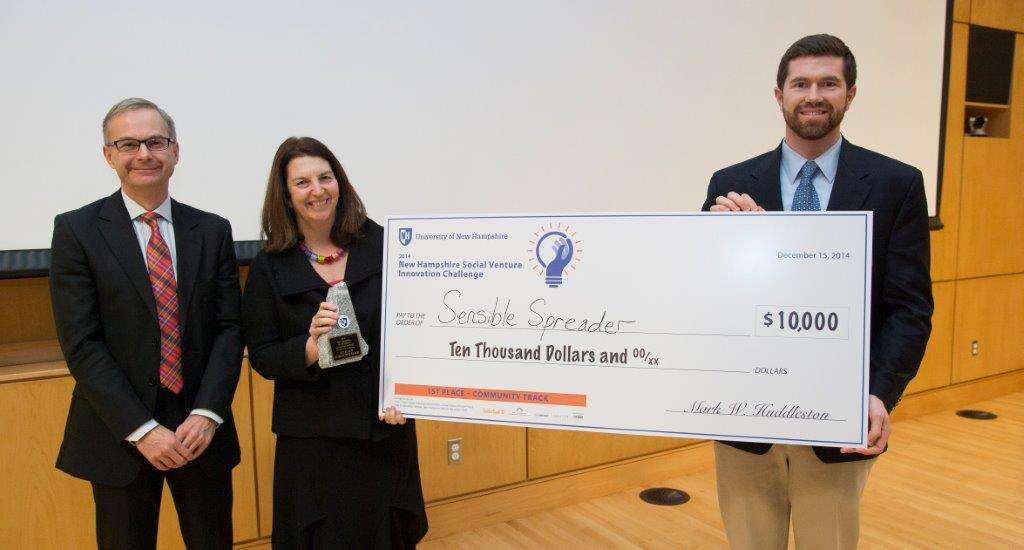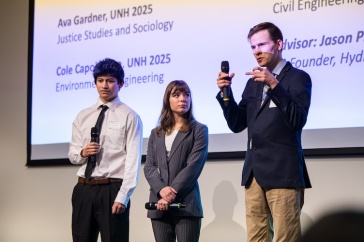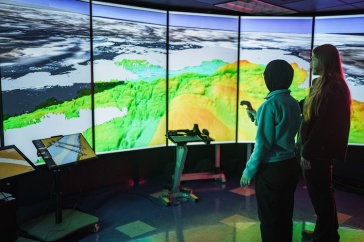It’s coming up on a year since the annual Social Venture Innovation Challenge put hard cash into the hands of budding entrepreneurs, and we thought we’d check in with a couple of the winners to see where they are with their ventures.

Andrew Jaccoma '12G (right), founder of Sensible Spreader Technologies and community winner of the 2014 Social Venture Innovation Challenge
Sensible Spreader Technologies develops software and wireless sensors that help municipal road crews and other entities with fleets go about their business more efficiently.
The company’s dash-mounted mobile devices provide vehicle operators and fleet managers with up-to-the-minute information. It’s called “coverage indication technology.”
The software consists of a map with layered, time-based coverage trails that run on the mobile device and wireless sensors that transmit real-time data throughout the fleet. So, snowplow operators or street sweepers, for example, can see in real-time where they’ve plowed or swept, and, importantly, where other plows and sweepers in their fleet have been — and how recently — letting them reduce waste and avoid duplication of efforts.
“It really increases the intelligence of the fleet, or swarm, allowing operators to work together more efficiently” says Andrew Jaccoma '12G, founder of the company. “We believe this is a major advancement in road maintenance.”
Customers can log into Sensible Spreader’s website at any time to pull up historical data on the movements of their vehicles.
“That injection of capital allowed us to go out and not think twice about buying more equipment.”Jaccoma and his business partners had been self-funding the venture for many months before walking away with the $10,000 first-place prize in the community division of the 2014 Social Venture Innovation Challenge.
Jaccoma says the SVIC came at a critical time for the company.
Jaccoma says. That equipment is now on loan with a state agency and four municipalities that are taking the technology for a test drive.
It also allowed Jaccoma and his partners — a software engineer, an electrical systems engineer and a mechanical engineer — to purchase the latest tablets and sensor components for field-testing.
Making Food Deserts History
 Bradley and Shannon Calabro '15G won the student division of the 2014 Social Venture Innovation Challenge for their idea to turn food deserts into oases. They envision buses, retrofitted to serve as mobile markets that visit many neighborhoods daily, carrying healthy items such as fresh produce and proteins into areas where such foods are hard to find, expensive or non-existent.
Bradley and Shannon Calabro '15G won the student division of the 2014 Social Venture Innovation Challenge for their idea to turn food deserts into oases. They envision buses, retrofitted to serve as mobile markets that visit many neighborhoods daily, carrying healthy items such as fresh produce and proteins into areas where such foods are hard to find, expensive or non-existent.
“It’s essential for us always to have the latest gizmos and gadgets to test out,” Jaccoma says. “So I drove around all summer with tablets in my car and machinery on the floor of the passenger side emulating our system.”
Of the Sensible Spreader team, Jaccoma says, “We are all forward-thinking innovation enthusiasts, so we are essentially continually conducting research and development. Having that money is very helpful.”
What’s next for Sensible Spreader?
“In the short term, we’ll continue trying to tell as many municipalities as possible about the benefits of our system,” Jaccoma says.
“We’re very interested in both street sweeping and winter maintenance applications, and though we’re currently focused on municipalities and state agencies, we would like to start working with commercial contracting fleets as well as universities in the future.”
Registration is open for the 2015 Social Venture Innovation Challenge.
What’s your idea? Alex Freid ’13, winner of the first SVIC, says, “Turn your wild idea into reality.”
The Social Venture Innovation Challenge is co-hosted and organized by the Peter T. Paul College of Business and Economics, the Carsey School for Public Policy, the Sustainability Institute, NH EPSCoR, Net Impact UNH and UNH Innovation. Supporters include Timberland, the New Hampshire Charitable Foundation, PixelMEDIA, AlphaLoft and New Hampshire Business Review.
-
Written By:
Tracey Bentley | Communications and Public Affairs



















































